|
|
|
Sort Order |
|
|
|
Items / Page
|
|
|
|
|
|
|
| Srl | Item |
| 1 |
ID:
100999


|
|
|
|
|
| Publication |
2010.
|
| Summary/Abstract |
This article examines central-provincial relations in the context of greater centralization. Focusing on the background of provincial leaders, the leadership management system, and the fiscal system, it suggests that there has been an unmistakable trend toward greater central control. However, greater centralization has coexisted with decentralization in many areas of governance. While greater centralization has not completely changed the particularistic character of central- provincial interactions, the arena has shifted to bargaining and lobbying for central largess. Provincial bargaining now occurs in a context in which the central government is in control of considerably greater resources and more capable of setting the rules of the game. This study of the central-provincial relations helps to contextualize the study of Hong Kong's relationship with Beijing first by pointing to their different natures and characters. At the same time, salient developments in central-provincial relations in the main body politics also form the context for Hong Kong's relationship with Beijing.
|
|
|
|
|
|
|
|
|
|
|
|
|
|
|
|
| 2 |
ID:
149173
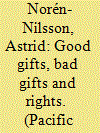

|
|
|
|
|
| Summary/Abstract |
In the Cambodian national elections in 2013, the opposition Cambodia National Rescue Party (CNRP) experienced a strong surge in support, finishing a close second to the long-incumbent Cambodian People’s Party (CPP). Whilst the CNRP campaigned on an anti-money politics, rights-based agenda, the CPP has relied on gift-giving practices to maintain links with voters. This article explores changing popular conceptions of issue_images_89_4_nilsson_cambodia-election-perceptions-ea-image02-jpgprovision to assess to what extent a democratic, rights-based conscience in Cambodia has emerged under the current neo-patrimonial regime. Building on qualitative interviews with 192 voters in post-election Cambodia, it finds that gift-giving practices play a different role than current academic theorizations of popular politics, and Cambodian popular politics in particular, would lead us to expect. Ordinary Cambodians are found to make a distinction between contingent and non-contingent exchanges in electoral mobilization, rejecting the former and embracing the latter. CPP gift giving in its current guise is consequently devoid of popular legitimacy across the political camps. At the same time, the idea of meritorious gift giving lives on as an ideal, especially among CNRP supporters.
|
|
|
|
|
|
|
|
|
|
|
|
|
|
|
|
| 3 |
ID:
133577
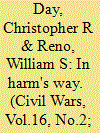

|
|
|
|
|
| Publication |
2014.
|
| Summary/Abstract |
This article explains why contemporary African regimes choose different counter-insurgency strategies and why they tend not to be population-centric. We argue that strategies correspond to the ways in which incumbent regimes in Africa deal with different segments of political society through patronage. Incumbents seek varying levels of accommodation with rebel leaders, or try to eliminate them, according to rebels' historical position within the state. This variation reflects differences in perceived political threats posed to incumbents. We classify these threats as high, moderate or low, which are associated with counter-insurgency strategies of group control, insurgent control and insurgent elimination, respectively.
|
|
|
|
|
|
|
|
|
|
|
|
|
|
|
|
| 4 |
ID:
144246


|
|
|
|
|
| Summary/Abstract |
This article identifies the long-term political factors that contributed to the Ebola crisis in Sierra Leone, factors which are largely overlooked by the emerging international focus on building resilient health systems. We argue that the country exhibits critical symptoms of the recurrent crises of a gatekeeper state, including acute external dependency, patron–client politics, endemic corruption and weak state capacity. A coterie of actors, both internal and external to Sierra Leone, has severely compromised the health system. This left certain sections of the population acutely at risk from Ebola and highlights the need for political solutions to build stronger, inclusive health systems.
|
|
|
|
|
|
|
|
|
|
|
|
|
|
|
|
| 5 |
ID:
152257
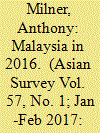

|
|
|
|
|
| Summary/Abstract |
In 2016 Prime Minister Najib overcame challenges that many predicted would destroy him. The crisis, however, has helped to deepen many of the fault lines in Malaysian politics and society, and to promote public apprehension. Much will now depend on the resilience of the country’s institutions and economy.
|
|
|
|
|
|
|
|
|
|
|
|
|
|
|
|
| 6 |
ID:
117143
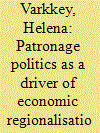

|
|
|
|
|
| Publication |
2012.
|
| Summary/Abstract |
Recent evidence has linked illegal peat and forest fires in Indonesia to commercial oil palm plantations. Fire is the most cost-efficient way to clear land for planting, but these fires release smoke causing transboundary haze pollution. The countries worst affected by the haze are neighbouring Malaysia and Singapore. Malaysian and Singaporean investors control more than two-thirds of the Indonesian oil palm plantation sector and they have been implicated in the fires alongside local plantations. Using information obtained from interviews with individuals linked to the sector, this paper aims to explain why these companies continue to burn despite the dire consequences of the haze. It identifies patronage politics as a common business culture in Southeast Asia, and argues that because these Malaysian and Singaporean investors are already familiar with patronage practices at home, they have easily inserted themselves into existing patronage networks in Indonesia. Hence, these companies enjoy the protection of their Indonesian patrons during their operations. Furthermore, in a business atmosphere defined by patronage politics, clients are largely motivated by material gain. This explains why Malaysian and Singaporean investors continue to clear land by fire in the interests of cost-efficiency, despite their home countries suffering the worst effects of haze.
|
|
|
|
|
|
|
|
|
|
|
|
|
|
|
|
| 7 |
ID:
148548
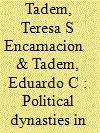

|
|
|
|
|
| Summary/Abstract |
The results of the 2013 Philippine mid-term elections highlighted the dominance of political dynasties in the country. With all 80 provinces littered with political families, 74 percent of the elected members of the House of Representatives came from such dynastic groups. Despite overwhelming recognition that political dynasties breed patronage politics and corruption, no substantial steps have been undertaken to address this issue. This article examines the general nature of Philippine political dynasties, the reasons for their continuing existence and their adverse impact on the country. This problem emanates basically from three factors: (1) the political and socio-economic foundations upon which political dynasties are built; 2) the inability to effectively implement Philippine constitutional provisions by enacting an enabling law; and 3) the weakness of potential countervailing forces that would challenge political dynasties.
|
|
|
|
|
|
|
|
|
|
|
|
|
|
|
|
| 8 |
ID:
133137
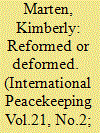

|
|
|
|
|
| Publication |
2014.
|
| Summary/Abstract |
A great deal of international attention and funding was given to reform and training of the Palestinian Authority Security Forces (PASF), starting with the Oslo Accords process in 1993 and accelerating with the advent of Fayyadism and the expulsion of the Palestinian Authority government from Gaza in 2007. Many donors and other supporters in the US, the EU, and Israel claimed this process as a success story, and indeed from 2008-2010 local conditions looked hopeful in the fragile, post-conflict West Bank proto-state. But soon unresolved political conflicts inside the West Bank encouraged patronage-based violence to reemerge within the security forces, and the fractured approach of the international community aggravated the situation. By 2013 reform had stalled. This article explores the history of patronage politics in the PASF and uses the Palestinian example to highlight the tensions inherent in contested visions of security, when international donors define success in terms of anti-terrorism rather than genuine domestic security governance.
|
|
|
|
|
|
|
|
|
|
|
|
|
|
|
|
| 9 |
ID:
179929


|
|
|
|
|
| Summary/Abstract |
The ‘Sahelistan’ discourse that conflates conflict dynamics in Afghanistan and Mali is widespread in Western media and policy circles. We argue that such representations contribute to the adoption of one-size-fits-all conflict management policies. Drawing on extensive fieldwork in both places, we also argue that these standard templates of intervention shape responses from local non-state armed actors, who manipulate foreign interveners for their own (violent) purposes in similar ways. Yet, we show that this convergence in armed group behaviour still manifests itself in important variations in widely different contexts, furthering strongmen autonomy in Afghanistan, while fostering armed group fragmentation in Mali.
|
|
|
|
|
|
|
|
|
|
|
|
|
|
|
|
| 10 |
ID:
155377


|
|
|
|
|
| Summary/Abstract |
Much of the research exploring democratisation of rural society has focused on changes occurring in the formal political process of elections. In contrast, this article examines the extent of democratisation and the decline of caste in rural society by investigating morality and interactions in diverse political spaces of a village in south India. Our findings suggest that although caste hierarchy and the ideology of patronage have lost their legitimacy in regulating interactions in the course of formal political processes such as elections and institutions of local administration, they continue to command the moral allegiance of village society in the domain of everyday social and political interactions. The study concludes that although there are significant discontinuities in the use of caste power in rural India, caste dominance continues to persist.
|
|
|
|
|
|
|
|
|
|
|
|
|
|
|
|
| 11 |
ID:
137209
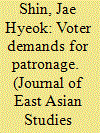

|
|
|
|
|
| Summary/Abstract |
In this article I seek to explain the microfoundations of patronage politics in the developing world. Two distinct approaches have evolved in the literature. One puts emphasis on the demand side, arguing that patronage persists because poor voters tend to desire individualistic goods over policy. The other focuses on the supply side: few politicians offer programmatic policy, so voters have no alternative but to vote for the politicians who distribute patronage. In this study I test those competing theories using original data from Jakarta, Indonesia. I find evidence supporting the demand-side theory: when both patronage and policy are offered, poor, less-educated voters tend to demand patronage, such as jobs and money, over national programs like free education and universal health care, whereas well-off, better-educated voters tend to prefer the national policies. However, the study also reveals that demands for patronage are affected by level of participation in politics: those who voted in previous elections and those who affiliate with a political party are more likely to demand patronage. This microfoundational evidence helps to explain the persistence of patronage politics in places of widespread poverty.
|
|
|
|
|
|
|
|
|
|
|
|
|
|
|
|
|
|
|
|
|